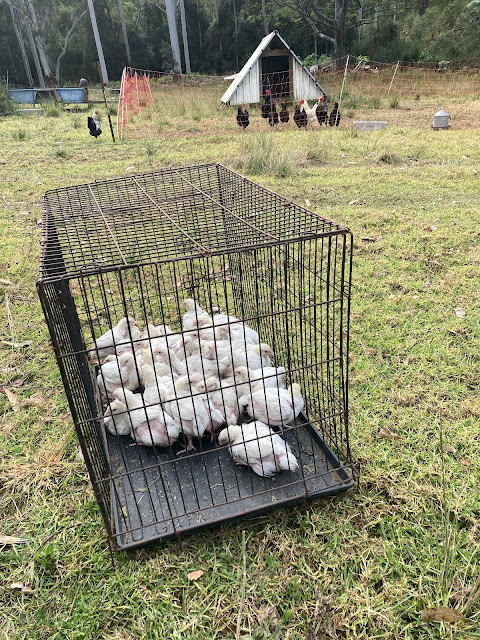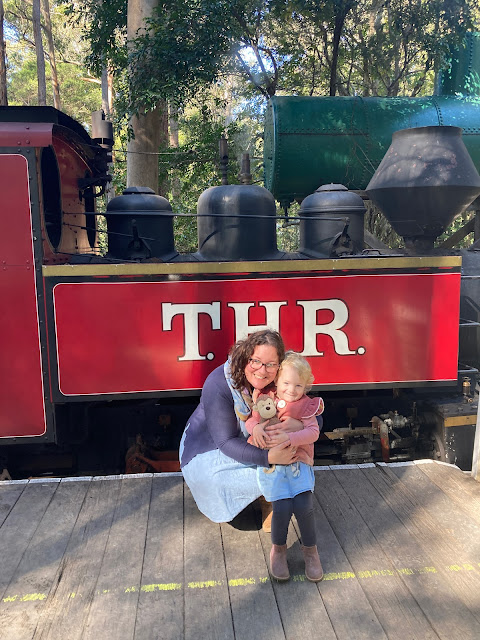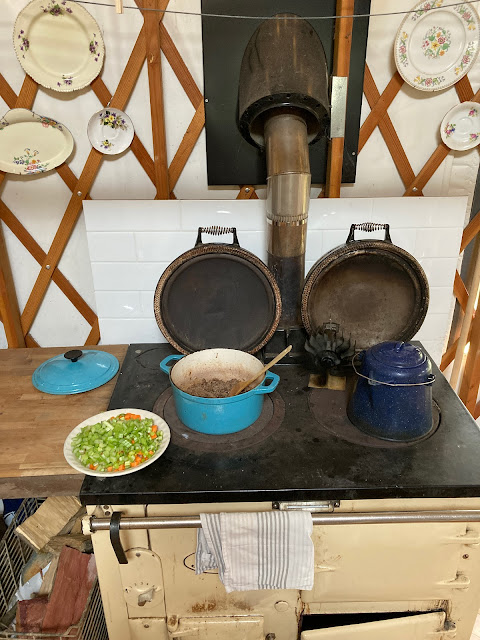Recently we had a friend over for dinner and he offered us 30 meat chooks that were surplus to his needs. He kindly grew them out until they no longer needed heating and then passed them on to us for a carton of beer.
We have no experience growing meat chooks, so it will be an interesting experiment. So far they are living very happily with our egg chooks, scratching about on pasture and able to freely undergo their natural chicken behaviours. I foresee a lot of chicken dinners in the future.
We will have to process them at various sizes due to only having very limited freezer space. We also have a couple of Australorp roosters which are not too far from going in the pot. I'm interested to see the difference in flavour and texture between the meat chickens and the heritage Australorp chicken. We might need to cook them side by side as a comparison.
It's already clear that the meat chickens are a far more cost-effective breed to put in the pot. The rate at which they can convert feed into weight is astounding to watch. They are already the same size as our Austrlorp chicks that hatched out 6 weeks ago.
We also have another new addition to the farm, which readers who follow along on Instagram might have already heard about. Meet Emma the Maremma who is to the right of Hagrid in the photo below. We will probably change her name to Gemma, as there is already one Emma here, clearly. And since I was here first, I claim shotgun on keeping my name. Already I have called back to answer Grant when he was calling her. Ha!
Emma is a really sweet girl. She has gentle kind eyes and particularly loves the kids, having grown up with children. She was given to us from another lovely, caring small farm. Her last farm had regular open days, and she was no longer coping with visitors on her turf.
Guardian livestock dogs are working dogs, they have been bred for thousands of years to be independent and protect their flock (animal and people) from perceived threats. Maremmas are known for being snappy dogs and as such, require respect. Anatolian shepherds like Hagrid are generally considered less snappy, but they are bigger dogs with a significantly stronger jaw. They too are bred to protect their flock and protect they will do. Having seen Hagrid in action, I wouldn't want to be on the end of those jaws.
Sadly, there are many livestock guardian dogs surrendered as their owners realize they have taken on more than they can handle. Sure, they are cool dogs. Sometimes people get lucky and end up with a chilled-out companion. But all too often, as any livestock guardian rescue organisation will tell you, people find themselves with a big independently-minded dog that has become excessively protective over its environment.
Emma's previous owners are lovely and I was pleased to make more connections with similarly minded people in the area. They carefully made sure she was going to another farm, where she had the company of another livestock dog and would be able to work. They really do love it, and I'm pleased that she has settled in so beautifully.
All the other creatures on the farm are doing well. They all look happy the weather has dried out after an incredibly wet summer. Tucker the border collie is delightful as always, Aggie continues to rule the roost. Barking to be let out at ungodly hours of the morning and then barking again to be let back in, lest she is forced to sleep outside. The cats are content, the cattle are looking fat and healthy and Hagrid is thrilled with his new mate. Hopefully, she will help calm him down a bit and grow a brain, he's a bit like an over-exuberant 18-year-old boy at the moment.
Now we just need more goats for them to guard. I'm not sure Bob the billy goat has done his job this time around. The girls should have kidded before winter and though they all look nice and round, they are not showing any signs of kidding anytime soon. We had planned for them to kid before winter, so we will give them a few more weeks and if there is no action then we might have to start looking for a new billy goat.
Well, that's about all the animal updates I have to offer this morning. I hope this finds you well.
Much love,
Emma
xx



















